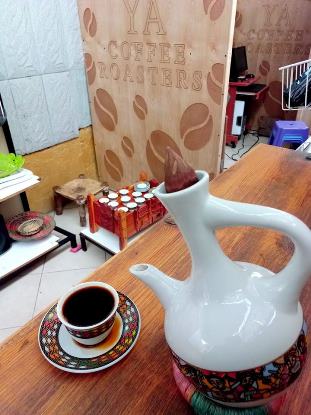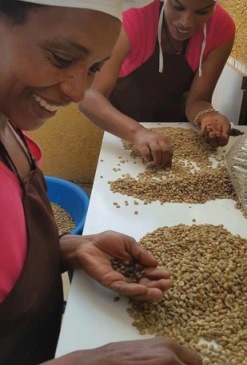Back to where the brew began: supporting Ethiopian coffee roasters

The history of coffee is as long and colourful as the list of brews available in cafés and restaurants around the world. According to tradition, the Arabic coffee originates from Ethiopia. And if entrepreneur Sara Yirga has her way, Ethiopian coffee will be making a comeback on international coffee markets in the years ahead. With CBI’s support, Sara’s company YA Coffee Roasters already has a growing fan base.
YA Coffee Roasters is a small artisan coffee roasting company based in Addis-Ababa, Ethiopia. Founder and General Manager Sara Yirga, a firm believer in exporting coffee roasted at origin, is currently negotiating a deal with one of the largest coffee coops in southern Ethiopia. ‘Our ambition is to roast and export as many varieties of traceable, high-quality export-grade coffee from Ethiopia as we can.’
Export Opportunities
Launched in 2012, YA Coffee’s main focus is the export market, which includes Europe. CBI’s studies on the European coffee market show rich opportunities, especially for specialty coffees. Europeans crave quality and new flavours – and are willing to pay for them. Sara came into contact with CBI at the African Fine Coffee Association (AFCA) conference in 2015 and soon joined the Coffee Export Coaching Programme. ‘CBI’s most important contribution has been to help me develop an Export Marketing Plan and to offer encouraging advice on our market potential,’ she says.
Challenge
There is one major hurdle: many European coffee companies traditionally have done all their roasting themselves, claiming that European tastes are so specific that non-European suppliers cannot get them right. Sara is undaunted by this resistance. ‘Getting the roasting profiles right is a technical capacity we can build on from feedback we receive from our customers and from experience,’ she comments. ‘It can be perfected. We aim to grow our roasting facility to cater to any acquired taste.’
Proudly made in Africa
Like most newcomers in Europe’s specialty coffees segment, however, YA Coffee cannot yet compete with Europe’s big roasters. Instead, Sara is targeting online retailers and specialty shops. But even there, roasting is a sensitive issue. Explains Sara, ‘Managing concerns about roasting at origin and gaining the trust of buyers is crucial. Thankfully, we took a big step forward in that area when the CBI gave us the opportunity to get support in branding and packaging design from Proudly Made in Africa, a non-governmental organisation that facilitates trade between African producers and international retailers.’
Women in Coffee
CBI also collaborated with Sara to promote gender awareness, inviting her to participate in the Ethiopian branch of Women in Coffee. This joint initiative of the International Trade Centre (ITC) and the International Women’s Coffee Alliance (IWCA) aims at supporting the establishment of women’s associations in the coffee sector. In the same context, Sara was a panel member at the World Trade Organisation’s 2017 Aid for Trade Conference in Geneva.
Restoring a country’s heritage
Ethiopia is the original home of the coffee plant and the earliest accounts of coffee in its brewed form date back to 900 AD: the world’s leading hot drink has long been part of Ethiopia’s history. ‘Our company benefits hugely from this heritage,’ says Sara. ‘However, we believe Ethiopian coffee deserves a much better place in the international coffee scene than it has today. We’re committed to giving it that place by developing YA Coffee into a brand recognized in the major cities of Europe by the end of 2020.’
Want to know more about YA Coffee Roasters? Visit the company’s website at www.yabunnaet.com or check out its activities on Facebook, Twitter and #SheTrades

